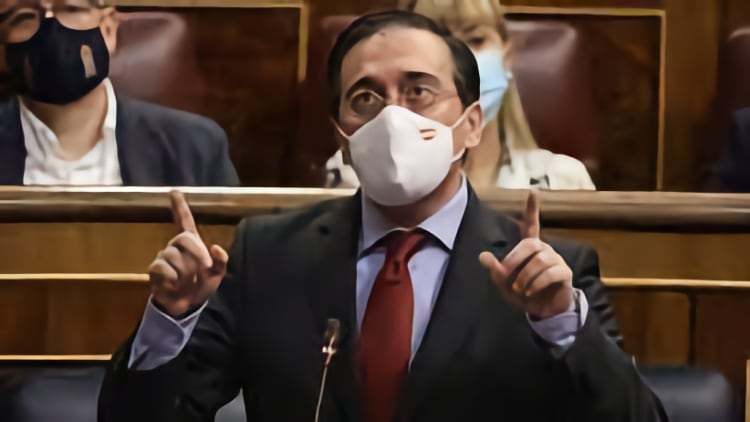The Diplomat
The Minister of Foreign Affairs, José Manuel Albares, assured yesterday that the interests of Spain, and in particular those of the Canary Islands, “will always be defended” by the Government against Morocco.
A day before the President of the Government, Pedro Sánchez, travels to Rabat to meet with King Mohamed VI, Albares, who will accompany him on the trip, had to respond to the concerns expressed to him in Congress by the Nueva Canarias deputy Pedro Quevedo about the Canary Islands archipelago.
In a question to the minister, Quevedo criticised the government for what he described as a “very weak response” to Morocco’s “unilateral actions to appropriate the territorial waters of the Canary Islands”.
“The Canary Islanders know the expansionist policy of the Kingdom of Morocco, not just the blackmail with immigration”, said the Canary Islands MP, who called on the government to rectify its decision to support Morocco’s autonomy plan for Western Sahara.
The Canary Islands MP’s concern stems from the situation created when, at the beginning of 2020, Morocco passed two laws delimiting the Moroccan territorial sea up to 12 miles and the exclusive economic zone (EEZ) of 200 miles from its coasts. This delimitation conflicted with the delimitation of Spanish territorial waters in the Canary Islands. The Spanish government’s response was simply to state that both countries wish to resolve the issue by mutual agreement and in accordance with the UN Convention on the Law of the Sea.
Yesterday, Albares tried to reassure Pedro Quevedo, indicating that the Canary Islands are an important part of Spain’s relationship with Morocco and that, for this reason, he devotes an important part of his time to them. “The interests of Spain, and especially of the Canary Islands, will always be defended, of that there can be no doubt”, he assured him.
With regard to the position on Western Sahara, the minister insisted on maintaining that there has been no change of position on the part of the government, despite the fact that in the letter sent by Sánchez to Mohammed VI on 14 March, the autonomy plan proposed by Morocco for the former Spanish colony was described as “the most serious, credible and realistic basis” for resolving the dispute.
According to Albares, Spain continues to say that the dispute ‘must be resolved within the framework of the United Nations and through a mutually acceptable solution’ for the parties.
And he once again defended the fact that the government of José Luis Rodríguez Zapatero welcomed the autonomy plan presented in 2007 by Rabat, and that under Mariano Rajoy this recognition was maintained at summits with Morocco.
He denied that there had been a “surrender to the blackmailing policy” of Morocco, as Quevedo reproached him, although he acknowledged that “there may be one more step, there may be a deepening, but we are within international legality”, while he argued that the Spanish position is in line with that of other countries such as France and Germany.
Yesterday, the new president of the PP, Alberto Núñez Feijó, reproached Pedro Sánchez for his “unilateral” turn on the Sahara after “breaking” a consensus on foreign policy and practising a policy “with a very important anti-democratic tic”.
In an interview on Telecinco, he wondered if today, in the meeting he will hold with the President of the Government at the Moncloa Palace before travelling to Rabat, he is going to “show” him this “clandestine agreement” with Morocco. “We do not know what the agreement consists of, nor do we know in this agreement what important and decisive part Spanish national sovereignty has, and therefore Ceuta and Melilla”, he pointed out.
For his part, the leader of Más País, Iñigo Errejón, in statements to Europa Press, called on the government to reconsider the “detour” on the Sahara after the agreement with Morocco and added that trusting that the Moroccan monarchy will fulfil its commitments is “too risky”.





